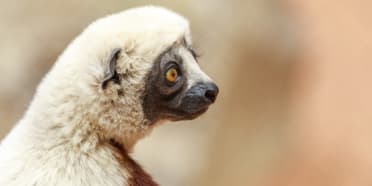- You are here:
- Home
- Countries & Parks
- Madagascar Parks
- Ankarafantsika National Park
- Reviews
- Expert Reviews
Expert Reviews – Ankarafantsika NP

Anthony is a photographer and writer for travel magazines and Lonely Planet, including the guides to Kenya and Botswana & Namibia.
Madagascar’s last dry deciduous forest
Ankarafantsika National Park contains the last dry deciduous forest left in Madagascar. The park is good for general wildlife. Its eight lemur species include real gems, such as the mongoose lemur, which you’ll almost certainly not see elsewhere, and the woolly grey mouse lemur. The rather lovely, and relatively new to science, golden-brown mouse lemur is also found here. Of all the 70 or more reptile species found here, my favorite (and the favorite of most visitors) is the rhinoceros chameleon. Take a look at the nose of the male, and you’ll know straight away how it got its name. And the chance to see the captive-breeding program for the threatened ploughshare tortoise always gives me hope. But it’s the birds that really make this park stand out. A huge 129 species, nearly half of all species found in Madagascar, have been seen within the park’s boundaries. I heard the sickle-billed vanga before I saw it, while the critically endangered Madagascar fish eagle also inhabits these parts.

Ariadne is a renowned African wildlife photographer whose work is featured in many well-known guidebooks and magazines.
A little-known gem hiding a sacred lake and canyon
Off-the-beaten track Ankarafantsika National Park is most known as a great birding destination. The woodland is home to several localized birds including Van Dam’s vanga and Schlegel’s asity. I took a boat trip on the sacred Lake Ravelobe in the hope of ticking off the rare endemic Madagascar fish eagle and I was thrilled to see one catching a fish. Birders and non-birders alike will want to walk to the spectacular Ankarokaroka canyon. The photogenic sandstone gorge created by river erosion looks most beautiful in the late afternoon light. Aside from the scenic highlights, I enjoyed a group of Coquerel’s sifakas moving through the forest at speed and I was amazed at the ease with which they propel themselves between branches up to 10m/32ft apart. Their terrestrial motion, resembling a jumping kangaroo with outstretched arms for balance, is less graceful. The headquarters at Ankarafantsika houses a breeding center for the critically endangered ploughshare tortoise. Although visitors aren’t allowed inside, it’s worth having a look through the fence and the guides will happily tell you about the program and its success in saving this species from extinction.

Philip is an acclaimed travel writer and author of many guidebooks, including the Bradt guides to Uganda, Tanzania, Kenya and South Africa.
Forest of rarities
One of my favourite national parks in Madagascar is the 1,350km2 Ankarafantsika, whose diverse flora comprises more than 850 largely endemic plant species. We hiked the Circuit Grande Boucle, which follows an extensive patch of dry deciduous forest before emerging on a grassy plateau above the spectacular Ankarokaroka Canyon, a lovely river-carved gorge whose angular sandstone pillars and fields of crystalline fairy chimneys glow golden-red in the early morning and late afternoon light. We had great views of the lovely Coquerel's sifaka and brown lemur en route, but dipped out on seeing the localised mongoose lemur, a ferret-faced partially nocturnal frugivore listed as Critically Endangered by the IUCN. Bird-wise, the main draws are the localised Van Dam’s vanga, Schlegel’s asity and white-breasted mesite. I would strongly recommend a boat trip on the sacred Lake Ravelobe, which is a good place to look for the endemic Madagascar fish-eagle and Humblot's heron.


 Madagascar Parks
Madagascar Parks